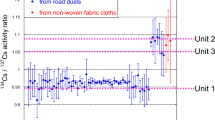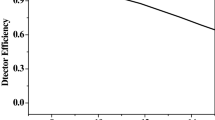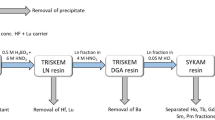Abstract
WHILE studying the H-particles found by Sir Ernest Rutherford to be the first disintegration product of aluminium and some other atoms, under α-bombardment, we have developed a new method for obtaining strong and practically constant sources of such radiation. The method consists in enclosing dry radium emanation mixed with pure oxygen within thin-walled capillaries of hard (potassium) glass, lined with some 12 µ thickness of aluminium foil pressing well against the glass. As a small number of long-range particles were given off from the glass itself, we have also made use of capillaries drawn out from tubes of pure silica.
This is a preview of subscription content, access via your institution
Access options
Subscribe to this journal
Receive 51 print issues and online access
$199.00 per year
only $3.90 per issue
Buy this article
- Purchase on Springer Link
- Instant access to full article PDF
Prices may be subject to local taxes which are calculated during checkout
Similar content being viewed by others
Author information
Authors and Affiliations
Rights and permissions
About this article
Cite this article
KIRSCH, G., PETTERSSON, H. Long-range Particles from Radium-active Deposit. Nature 112, 394–395 (1923). https://doi.org/10.1038/112394a0
Issue Date:
DOI: https://doi.org/10.1038/112394a0
Comments
By submitting a comment you agree to abide by our Terms and Community Guidelines. If you find something abusive or that does not comply with our terms or guidelines please flag it as inappropriate.



